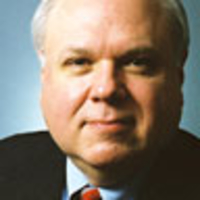
Where is the evidence that everything would be better if Republicans were in charge? Does anyone believe the economy would be growing faster or that unemployment would be lower today if John McCain had won the election? I know of no economist who holds that view. The economy is like an ocean liner that turns only very slowly. The gross domestic product and the level of employment would be pretty much the same today under any conceivable set of policies enacted since Barack Obama’s inauguration.
Until conservatives once again hold Republicans to the same standard they hold Democrats, they will have no credibility and deserve no respect.
In January, the Congressional Budget Office projected a deficit this year of $1.2 trillion before Obama took office, with no estimate for actions he might take. To a large extent, the CBO’s estimate simply represented the $482 billion deficit projected by the Bush administration in last summer’s budget review, plus the $700 billion Troubled Asset Relief Program, which George W. Bush rammed through Congress in September over strenuous conservative objections. Thus the vast bulk of this year’s currently estimated $1.8 trillion deficit was determined by Bush’s policies, not Obama’s.
I think conservative anger is misplaced. To a large extent, Obama is only cleaning up messes created by Bush. This is not to say Obama hasn’t made mistakes himself, but even they can be blamed on Bush insofar as Bush’s incompetence led to the election of a Democrat. If he had done half as good a job as most Republicans have talked themselves into believing he did, McCain would have won easily.
Conservative protesters should remember that the recession, which led to so many of the policies they oppose, is almost entirely the result of Bush’s policies. According to the National Bureau of Economic Research, the recession began in December 2007—long before Obama was even nominated. And the previous recession ended in November 2001, so the current recession cannot be blamed on cyclical forces that Bush inherited.
Indeed, Bush’s responsibility for the recession is implicit in every conservative analysis of its origins. The most thorough has been done by John Taylor, a respected economist from Stanford University who served during most of the Bush administration as the No. 3 official at the Treasury Department. In his book, Getting Off Track, he puts most of the blame on the Federal Reserve for holding interest rates down too low for too long.
While the Fed does bear much responsibility for sowing the seeds of recession, it’s commonly treated as an institution independent of politics and even the government itself. But the Federal Reserve Board consists of governors appointed by the president and confirmed by the Senate.
Because the president appoints the board, he has primary influence over its policies. This is especially the case for chairmen of the Fed appointed by Republicans because they often have ties to Republican administrations. Chairman Ben Bernanke was originally appointed as a member of the Fed in 2002, serving until 2005, when he became chairman of the Council of Economic Advisers in the White House, a position that made him Bush’s chief economic adviser.
As early as 2002, a majority of the seven-member Federal Reserve Board was Bush appointees, and by 2006 every member was a Bush appointee. While many critical decisions about monetary policy are made by the Federal Open Market Committee, the board’s position always prevails.
The Treasury secretary also has had breakfast with the Fed chairman on a weekly basis for decades. Consequently, most economists generally believe that every administration ultimately gets the Fed policy it wants. Therefore, one must conclude that if there were errors in Fed policy that caused the current downturn, it must be because the Fed was doing what the Bush administration wanted it to do.
To the extent that there were mistakes in housing policy that contributed to the recession, those were necessarily committed by Bush political appointees at the Department of Housing and Urban Development, Fannie Mae, Freddie Mac, and other agencies. To the extent that banks and other financial institutions made mistakes or engaged in fraudulent activity, it was either overlooked or sanctioned by Bush appointees at the Securities & Exchange Commission, the Comptroller of the Currency, the Commodity Futures Trading Commission, and elsewhere.
But in a larger sense, the extremely poor economic performance of the Bush years really set the stage for the current recession. This is apparent when we compare Bush’s two terms to Bill Clinton’s eight years. Since both took office close to a business cycle trough and left office close to a cyclical peak, this is a reasonable comparison.
Throughout the Bush years, many conservative economists, including CNBC’s Larry Kudlow, extravagantly extolled Bush’s economic policies. As late as December 21, 2007, after the recession already began, he wrote in National Review: “the Goldilocks economy is outperforming all expectations.” In a column on May 2, 2008, almost six months into the recession, Kudlow praised Bush for having prevented a recession.
But the truth was always that the economy performed very, very badly under Bush, and the best efforts of his cheerleaders cannot change that fact because the data don’t lie. Consider these comparisons between Bush and Clinton:
• Between the fourth quarter of 1992 and the fourth quarter of 2000, real GDP grew 34.7 percent. Between the fourth quarter of 2000 and the fourth quarter of 2008, it grew 15.9 percent, less than half as much.
• Between the fourth quarter of 1992 and the fourth quarter of 2000, real gross private domestic investment almost doubled. By the fourth quarter of 2008, real investment was 6.5 percent lower than it was when Bush was elected.
• Between December 1992 and December 2000, payroll employment increased by more than 23 million jobs, an increase of 21.1 percent. Between December 2000 and December 2008, it rose by a little more than 2.5 million, an increase of 1.9 percent. In short, about 10 percent as many jobs were created on Bush’s watch as were created on Clinton’s.
• During the Bush years, conservative economists often dismissed the dismal performance of the economy by pointing to a rising stock market. But the stock market was lackluster during the Bush years, especially compared to the previous eight. Between December 1992 and December 2000, the S&P 500 Index more than doubled. Between December 2000 and December 2008, it fell 34 percent. People would have been better off putting all their investments into cash under a mattress the day Bush took office.
• Finally, conservatives have an absurdly unjustified view that Republicans have a better record on federal finances. It is well-known that Clinton left office with a budget surplus and Bush left with the largest deficit in history. Less well-known is Clinton’s cutting of spending on his watch, reducing federal outlays from 22.1 percent of GDP to 18.4 percent of GDP. Bush, by contrast, increased spending to 20.9 percent of GDP. Clinton abolished a federal entitlement program, Welfare, for the first time in American history, while Bush established a new one for prescription drugs.
Conservatives delude themselves that the Bush tax cuts worked and that the best medicine for America’s economic woes is more tax cuts; at a minimum, any tax increase would be economic poison. They forget that Ronald Reagan worked hard to pass one of the largest tax increases in American history in September 1982, the Tax Equity and Fiscal Responsibility Act, even though the nation was still in a recession that didn’t end until November of that year. Indeed, one could easily argue that the enactment of that legislation was a critical prerequisite to recovery because it led to a decline in interest rates. The same could be said of Clinton’s 1993 tax increase, which many conservatives predicted would cause a recession but led to one of the biggest economic booms in history.
According to the CBO, federal taxes will amount to just 15.5 percent of GDP this year. That’s 2.2 percent of GDP less than last year, 3.3 percent less than in 2007, and 1.8 percent less than the lowest percentage recorded during the Reagan years. If conservatives really believe their own rhetoric, they should be congratulating Obama for being one of the greatest tax cutters in history.
Conservatives will respond that some tax cuts are good while others are not. Determining which is which is based on something called supply-side economics. Because I was among those who developed it, I think I can speak authoritatively on the subject. According to the supply-side view, temporary tax cuts and tax credits are economically valueless. Only permanent cuts in marginal tax rates will significantly raise growth.
On this basis, we see that Bush’s tax cuts were pretty much the opposite of what supply-side economics would recommend. The vast bulk of his tax cuts involved tax rebates—which failed in 2001 and again in 2008, because the vast bulk of the money was saved—or tax credits that had no incentive effects. While marginal rates were cut slightly—the top rate fell from 39.6 percent to 35 percent—it was phased in slowly and never made permanent. Neither were Bush’s cuts in capital gains and dividend taxes.
I could go on to discuss other Bush mistakes that had negative economic consequences, such as the Sarbanes-Oxley Act, which imposed a massive regulatory burden on corporations without doing anything to prevent corporate misconduct, and starting unnecessary wars in Iraq and Afghanistan, which will burden the economy for decades to come in the form of veterans’ benefits.
But there is yet another dimension to Bush’s failures—the things he didn’t do. In this category I would put a health-care overhaul. Budget experts have known for years that Medicare was on an unsustainable financial path. It is impossible to pay all the benefits that have been promised because spending has been rising faster than GDP.
In 2003, the Bush administration repeatedly lied about the cost of the drug benefit to get it passed, and Bush himself heavily pressured reluctant conservatives to vote for the program.
Because reforming Medicare is an important part of getting health costs under control generally, Bush could have used the opportunity to develop a comprehensive health-reform plan. By not doing so, he left his party with nothing to offer as an alternative to the Obama plan. Instead, Republicans have opposed Obama's initiative while proposing nothing themselves.
In my opinion, conservative activists, who seem to believe that the louder they shout the more correct their beliefs must be, are less angry about Obama’s policies than they are about having lost the White House in 2008. They are primarily Republican Party hacks trying to overturn the election results, not representatives of a true grassroots revolt against liberal policies. If that were the case they would have been out demonstrating against the Medicare drug benefit, the Sarbanes-Oxley bill, and all the pork-barrel spending that Bush refused to veto.
Until conservatives once again hold Republicans to the same standard they hold Democrats, they will have no credibility and deserve no respect. They can start building some by admitting to themselves that Bush caused many of the problems they are protesting.
Bruce Bartlett was one of the original supply-siders, helping draft the Kemp-Roth tax bill in the 1970s. In the 1980s and 1990s, he was a leading Republican economist. He now considers himself to be a political independent. He is the author of Reaganomics: Supply-Side Economics in Action and Impostor: How George W. Bush Bankrupted America and Betrayed the Reagan Legacy . His latest book, The New American Economy: The Failure of Reaganomics and a New Way Forward, will be published by Palgrave Macmillan in October.






